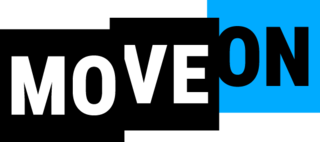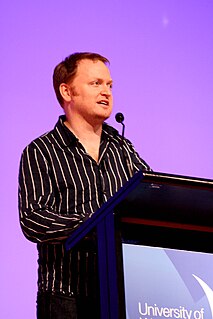
Advertising is a marketing communication that employs an openly sponsored, non-personal message to promote or sell a product, service or idea. Sponsors of advertising are typically businesses wishing to promote their products or services. Advertising is differentiated from public relations in that an advertiser pays for and has control over the message. It differs from personal selling in that the message is non-personal, i.e., not directed to a particular individual. Advertising is communicated through various mass media, including traditional media such as newspapers, magazines, television, radio, outdoor advertising or direct mail; and new media such as search results, blogs, social media, websites or text messages. The actual presentation of the message in a medium is referred to as an advertisement, or "ad" or advert for short.

A hoax is a falsehood deliberately fabricated to masquerade as the truth. It is distinguishable from errors in observation or judgment, rumors, urban legends, pseudosciences, and April Fools' Day events that are passed along in good faith by believers or as jokes.

A television advertisement is a span of television programming produced and paid for by an organization. It conveys a message promoting, and aiming to market, a product or service. Advertisers and marketers may refer to television commercials as TVCs.
Media manipulation is a series of related techniques in which partisans create an image or argument that favours their particular interests. Such tactics may include the use of logical fallacies, psychological manipulations, outright deception (disinformation), rhetorical and propaganda techniques, and often involve the suppression of information or points of view by crowding them out, by inducing other people or groups of people to stop listening to certain arguments, or by simply diverting attention elsewhere. In Propaganda: The Formation of Men's Attitudes, Jacques Ellul writes that public opinion can only express itself through channels which are provided by the mass media of communication – without which there could be no propaganda. It is used within public relations, propaganda, marketing, etc. While the objective for each context is quite different, the broad techniques are often similar.
An infomercial is a form of television commercial that resembles regular TV programming yet generally includes a toll-free telephone number or website. Most often used as a form of direct response television (DRTV), they're often program-length commercials, and are typically 28:30 or 58:30 minutes in length. Infomercials are also known as paid programming. This phenomenon started in the United States, where infomercials were typically shown overnight, outside peak prime time hours for commercial broadcasters. Some television stations chose to air infomercials as an alternative to the former practice of signing off. Some channels air infomercials 24 hours. Some stations also choose to air infomercials during the daytime hours mostly on weekends to fill in for unscheduled network or syndicated programming. By 2009, most infomercial spending in the U.S. occurred during the early morning, daytime and evening hours, or in the afternoon. Stations in most countries around the world have instituted similar media structures. The infomercial industry is worth over $200 billion.

MoveOn is a progressive public policy advocacy group and political action committee. Formed in 1998 in response to the impeachment of President Bill Clinton by the U.S. House of Representatives, MoveOn.org has raised millions of dollars for liberal candidates in the United States of America. It also runs a petition website similar to Change.org.
A trade association, also known as an industry trade group, business association, sector association or industry body, is an organization founded and funded by businesses that operate in a specific industry. An industry trade association participates in public relations activities such as advertising, education, publishing, lobbying, and political donations, but its focus is collaboration between companies. Associations may offer other services, such as producing conferences, holding networking or charitable events, or offering classes or educational materials. Many associations are non-profit organizations governed by bylaws and directed by officers who are also members.
The "Stand By Your Ad" provision (SBYA) of the Bipartisan Campaign Reform Act, enacted in 2002, requires candidates in the United States for federal political office, as well as interest groups and political parties supporting or opposing a candidate, to include in political advertisements on television and radio "a statement by the candidate that identifies the candidate and states that the candidate has approved the communication". The provision was intended to force political candidates running any campaign for office in the United States to associate themselves with their television and radio advertising, thereby discouraging them from making controversial claims or attack ads.
The voluntary sector, independent sector, or civic sector is the duty of social activity undertaken by organizations that are non-governmental nonprofit organizations. This sector is also called the third sector, community sector, and nonprofit sector, in contrast to the public sector and the private sector. Civic sector or social sector are other terms for the sector, emphasizing its relationship to civil society. Richard Cornuelle coined the term “independent sector” and was one of the first scholars to point out the vast impact and unique mechanisms of this sector. Given the diversity of organizations that comprise the sector, Peter Frumkin prefers "non-profit and voluntary sector".
The Advertising Council, commonly known as the Ad Council, is an American nonprofit organization that produces, distributes, and promotes public service announcements on behalf of various sponsors, including nonprofit organizations, non-governmental organizations and agencies of the United States government.

The Yes Men are a culture jamming activist duo and network of supporters created by Jacques Servin and Igor Vamos. Through various actions, the Yes Men primarily aim to raise awareness about problematic social and political issues. To date, the duo have produced three films: The Yes Men (2003), The Yes Men Fix the World (2009), and The Yes Men Are Revolting (2014). In these films, they impersonate entities that they dislike, a practice that they call "identity correction". The Yes Men operate under the mission statement that lies can expose truth. They create and maintain fake websites similar to ones they intend to spoof, which have led to numerous interview, conference, and TV talk show invitations. They espouse the belief that corporations and governmental organizations often act in dehumanizing ways toward the public. Elaborate props are sometimes part of the ruse, as shown in their 2003 DVD release The Yes Men. The Yes Men have collaborated with other groups of similar interest, including Improv Everywhere, Andrew Boyd and Steve Lambert.

In politics, campaign advertising is the use of an advertising campaign through the media to influence a political debate, and ultimately, voters. These ads are designed by political consultants and political campaign staff. Many countries restrict the use of broadcast media to broadcast political messaging. In the European Union, many countries do not permit paid-for TV or radio advertising for fear that wealthy groups will gain control of airtime, making fair play impossible and distorting the political debate in the process.
"Prouder, Stronger, Better", commonly referred to by the name "Morning in America", is a 1984 political campaign television commercial, known for its opening line, "It's morning again in America." The ad was part of the U.S. presidential campaign of Republican Party candidate Ronald Reagan. It featured a montage of images of Americans going to work, and a calm, optimistic narration that suggested that the improvements to the U.S. economy since the 1980 election were due to Reagan's policies. It asked voters why they would want to return to the pre-Reagan policies of Democrats like his opponent Walter Mondale, who had served as the Vice President under Reagan's immediate predecessor Jimmy Carter.

Charles Henry Danger Burgmann Firth is an Australian comedian, best known as a member of The Chaser productions CNNNN and The Chaser's War on Everything.
Educational advertisements are ad campaigns in which the creators attempt to inform, update, or persuade the public to engage in or avoid current issues. This type of advertisement is often negatively associated with propaganda. While similar to public service announcements, educational advertisements often cross into commercial fields whereas public service announcements are oriented on strict non-profit basis. Educational advertisements focus on a number of modern social, political, religious, and consumer-based issues. They traditionally appear on television and radio, but more and more campaigns are turning to the internet, especially email, as a cheap and efficient way to spread their messages. While most educational advertisements are deployed in the United States of America, there have been campaigns across Europe, Canada, and New Zealand. However, due to the dependence on technology to broadcast their messages, campaigns usually appear in developed countries where the largest possible population is likely to encounter their message.
The Minerals Resource Rent Tax (MRRT) was a tax on profits generated from the mining of non-renewable resources in Australia. It was a replacement for the proposed Resource Super Profit Tax (RSPT).
Advertising is a form of selling a product to a certain audience which communication is intended to persuade an audience to purchase products, ideals or services whether they want or need them. While advertising can be seen as a way to inform the audience about a certain product or idea it also comes with a cost because the sellers have to find a way to show the seller interest in their product., It is not without social costs. Unsolicited commercial email and other forms of spam have become so prevalent that they are a major nuisance to internet users, as well as being a financial burden on internet service providers. Advertising increasingly invades public spaces, such as schools, which some critics argue is a form of child exploitation. Advertising frequently uses psychological pressure on the intended consumer, which may be harmful. As a result of these criticisms, the advertising industry has seen low approval rates in surveys and negative cultural portrayals.

The Glover Park Group is an American communications consulting firm headquartered in Washington, D.C. The company was founded in 2001 by former White House and Democratic campaign officials Carter Eskew, Michael Feldman, Joe Lockhart and Chip Smith.

The history of advertising can be traced to ancient civilizations. It became a major force in capitalist economies in the mid-19th century, based primarily on newspapers and magazines. In the 20th century, advertising grew rapidly with new technologies such as direct mail, radio, television, the internet and mobile devices.








